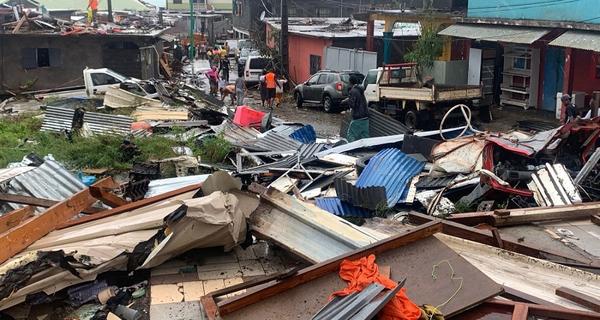Cyclone Chido ripped through Mayotte and other islands in the Indian Ocean in December 2024, leaving devastation in its wake. Tens of thousands of people were left without shelter, food, and clean water after the worst cyclone the region has experienced in the past 90 years. Less than a month later, the island was hit by floods and mudslides after a tropical storm, further slowing down recovery and aid efforts. Mayotte is France’s poorest territory, remaining a colony in all but name; the French state bears responsibility for the dead, injured and dispossessed. But instead of offering meaningful support, the government and far-right factions have instead seized the opportunity to foment anti-immigrant sentiment.
While cyclones are a regular occurrence in Mayotte, there is no doubt that Chido was exceptional in its intensity and destructive force. It’s been well-established that this kind of climatic event would increase in intensity and frequency with climate change. And yet, little was done to protect the people living on the islands from a natural disaster which was entirely predictable. Rather than invest in life-saving infrastructure and housing which could withstand cyclones, the vulnerability of Mayotte – aptly named by its French colonisers in 1843 as ‘the island of death’ – was ignored.
Because of Mayotte’s status – since 2011 – as a French département, and its classification as an ‘outermost region of the European Union’, it is a magnet for thousands of migrants from Africa, and particularly the neighbouring archipelago of Comoros as well as Madagascar, seeking entry into the EU. Although the latest data suggests that 84% of the islanders live below the poverty line and more than 40% survive on less than £140 a month, it remains relatively wealthy compared with Comoros and has access to the benefits of French social welfare. The result is that up to 50% of the population of Mayotte are immigrants, largely living in flimsy shantytowns, experiencing deep poverty and insecurity and subject to repressive French immigration controls. It is these communities that bore the brunt of the cyclone and tropical storm and whose situation is being exacerbated by French racism and bureaucracy.
In certain areas, the provision of aid has been refused to those without papers. Many are also seeing their residence permits expire, but are unable to renew them as state services remain unavailable; others aren’t able to even make an initial request. Migrants are also being expelled from accommodation centres. All are vulnerable to brutalisation at the hands of the colonial-style police, tasked specifically with tracking down undocumented migrants.
Meanwhile the humanitarian response to the cyclone was chaotic. Essential goods, like food and water, were painfully slow to be distributed on the island, because of a convoluted way of sending aid packages. Most of the resources are shipped from France, to Réunion (another island under French control in the Indian Ocean), before being flown into Mayotte, travelling nearly 10,000km. But the archipelago only has a single airport with regularly scheduled services, with short runways which don’t accommodate most wide-body aircraft. Many people were left for weeks without food and clean water. There are reports of residents drinking contaminated or sewage water. More than a month after the cyclone, there are communities which have yet to see substantial aid packages roll in. Fuel is in short supply, and students have only just begun to return to devastated classrooms.
Small wonder then, that French president Emmanuel Macron was heckled when he visited the island, announcing with typical colonial arrogance ‘If it weren’t for France, you would be 10,000 times deeper in shit’. Meanwhile, the French government and far-right factions are playing politics, preparing to use the devastation in Mayotte as a tool to push further racist immigration policies. Successive immigration bills passed in 2018 and in 2024 had already sought to restrict automatic birthright citizenship; there are now talks of it being removed completely. Operation Wuambushu, spearheaded by Gerald Darmanin, ex-Interior Minister and now Minister of Justice in 2023, has the explicit objective of expelling illegal immigrants, destroying slums, and fighting crime. It has led to shantytowns being razed to the ground and hundreds of migrants deported; in one case, a child was shot in the leg and held in custody for 48 hours as police threatened to deport his parents. This repressive operation is likely to intensify in the coming period.
Purchased by France in 1841 and then formally colonised in 1843, Mayotte was developed as a highly profitable sugar-producing colony. Then in the latter part of the 19th century, the French colonial empire extended its reach to the rest of the islands in the Comorian archipelago. Mayotte is therefore much further integrated into the French administrative and legal system due to its longer history as a part of the French empire. In 1974, all of the Comoros archipelago put to a vote the question of independence. Every other Comorian island decided to become independent; only Mayotte opted to remain under French control. But it is a relationship increasingly under strain. 2024 was a year of revolt against French imperialism. From the rejection of French interference by the Alliance of Sahel states in west Africa to uprisings in French overseas territories such as New Caledonia in the Pacific and mass protests in the Caribbean islands of Martinique and Guadeloupe, the victims of French imperialism are organising against oppression, poverty and racism. The fault lines exposed by Cyclone Chido could prompt renewed resistance in Mayotte too.
Sarah Guebre-Egziabher
FIGHT RACISM! FIGHT IMPERIALISM! 304 February/March 2025




